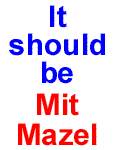A Mitzvah of Intoxication?
"One is obligated to drink on Purim until one doesn't know the difference between "Cursed is Haman" and "Blessed is Mordechai"
Q. What does it mean when the sages 'pass a law' saying "One is obligated'? Who is obligating us? The authority of the Rabbis? The authority of Torah that tells us to obey the rabbis? Or possibly reality itself?
In the example of Purim it is Purim itself that 'obligates'. It is the quality of the day. If you felt the energy that Purim produces you would feel 'obligated', compelled, moved to get yourself beyond 'cursed' and 'blessed'; you would come to a place where Haman is despised and Mordechai is adored for their essences, ABSOLUTELY, even if they were both cursed or both blessed.
True is true. Nothing matters beyond the truth. For example: there are no other gods besides G-d. So I don't worship idols. Is G-d more powerful than the idol? Irrelevant. Idols are not true. Is idol worship cursed and damning? Irrelevant! If idols were beautiful, meaningful and inspiring, if they brought rain or made you fertile, if it could heal sickness and bring bliss, I still do not worship them because they are not true. Like the false prophet who impresses with unusual talents and psychic ability, he is still a false prophet if he contradicts the truth of Torah.
Are we too confused to know simple truths? Are we too sophisticated to appreciate that right is right and wrong is wrong?
Sin is sin. Must it also be too expensive before I reject it?
Sin is sin. Must it also be unnatural? Perverted? Unhealthy? Distasteful? Pig is forbidden but what if it is the healthiest meat? What if it is cheaper, cleaner, more tasty than kosher food?
Would that change the truth?
A Jew can not marry a non-Jew; It is not a marriage. But if he is a doctor? Nicer than any Jew you've met and more spiritual? What if he is “blessed” and Jews are "cursed"? Then what?!
And this is the message of Purim and the Mitzvah to not know the difference between "Cursed is Haman" and "Blessed is Mordechai": Regardless of all other considerations, Haman remains Haman and Mordechai is still the Yehudi.
Send Page To a Friend
Q. What does it mean when the sages 'pass a law' saying "One is obligated'? Who is obligating us? The authority of the Rabbis? The authority of Torah that tells us to obey the rabbis? Or possibly reality itself?
In the example of Purim it is Purim itself that 'obligates'. It is the quality of the day. If you felt the energy that Purim produces you would feel 'obligated', compelled, moved to get yourself beyond 'cursed' and 'blessed'; you would come to a place where Haman is despised and Mordechai is adored for their essences, ABSOLUTELY, even if they were both cursed or both blessed.
True is true. Nothing matters beyond the truth. For example: there are no other gods besides G-d. So I don't worship idols. Is G-d more powerful than the idol? Irrelevant. Idols are not true. Is idol worship cursed and damning? Irrelevant! If idols were beautiful, meaningful and inspiring, if they brought rain or made you fertile, if it could heal sickness and bring bliss, I still do not worship them because they are not true. Like the false prophet who impresses with unusual talents and psychic ability, he is still a false prophet if he contradicts the truth of Torah.
Are we too confused to know simple truths? Are we too sophisticated to appreciate that right is right and wrong is wrong?
Sin is sin. Must it also be too expensive before I reject it?
Sin is sin. Must it also be unnatural? Perverted? Unhealthy? Distasteful? Pig is forbidden but what if it is the healthiest meat? What if it is cheaper, cleaner, more tasty than kosher food?
Would that change the truth?
A Jew can not marry a non-Jew; It is not a marriage. But if he is a doctor? Nicer than any Jew you've met and more spiritual? What if he is “blessed” and Jews are "cursed"? Then what?!
And this is the message of Purim and the Mitzvah to not know the difference between "Cursed is Haman" and "Blessed is Mordechai": Regardless of all other considerations, Haman remains Haman and Mordechai is still the Yehudi.
Send Page To a Friend








4 Comments:
Two points in Megilat Esther are not clear. Firstly, what brought on the decree to destroy all the Jews, and secondly, what suddenly happened that caused the decree to be canceled? To understand this, we will look at the story of Purim.
Like a bolt of lightning, the decree "to destroy to kill, and to annihilate all Jews, both young and old, little children and women, in one day" fell upon Persian Jewry. The reaction of the Jews to this edict was quite puzzling. The Megilah says that the "City of Shushan was in consternation". Consternation? Certainly, a more normal reaction would be to shout or cry. But "consternation"?
But if we take a glimpse at the situation of Persian Jewry at the time, we would see that consternation is the reaction we might expect after all. For it never entered their minds that such a thing could ever happen. They were the biggest patriots! They were the most loyal to Achasverosh! That is why when Achashverosh (nine months earlier) sent out invitations for the 180-day feast, the Jews were the first ones to confirm their attendance. All this despite the protests from the "extremists" such as Mordechai, who warned against their participation in such a feast, since it's intention was to make the Jews assimilate. But the Jews wanted to prove that they are not different than the rest. Thus the reaction of consternation upon hearing the shocking decree.
But then the Megilah continues: "And Mordechai knew all that was done..." He had no illusions, and understood fully what caused the decree. He knew that the assimilation - precisely what the Jew thought would ease anti-Semitic tensions, was the very cause of the decree! For the rule was learned since our days in Egypt: Whenever the Jew tries to water down his Judaism and be accepted by the gentile, the latent hatred (which is always there) of the gentile towards the Jew outwardly manifests itself.
If so, why was the decree annulled? Because immediately upon receiving word of the decree, Mordechai, as we mentioned, knew the reason for it, and did not give up. He also did not go on a boot-licking campaign to plead the case of the Jews to the king or his cabinet, despite the fact that he was no stranger to the palace and had connections there. What he did was to undergo a last-ditch effort to awaken the Jews to understand the real cause of the problem - that precisely their effort to shed their uniqueness as Jews and to blur over their Jewish identity and be like goyim is what brings upon them bad times.
Indeed, it is not easy to convey such a message to a Jew, when he is so caught up in having the goy love him. Because such a message seems to contradict all logic. But in Shushan, a great miracle occurred, and it is the real hidden miracle of Purim - the Jews did "Tsheuva"! And not just "Tsh'uva" of talking without backing it up, but rather one of deeds. Instead of continuing to grovel to the Persians and bring down barriers as most Jews naturally react, they made themselves subservient to the truth of Mordechai only, admitting to their original mistake of participating in the forbidden banquet. This was the significance of the mass fast which was declared. It signified a genuine "Tsheuva" to G-d.
By the way, now we can see why the Name of G-d does not appear in Megilat Esther, despite the fact that the theme of the story is "Tsh'uva to G-d". It is to tell us that when there is distress, one should not just rely on G-d to solve our problems in some miraculous fashion. Rather, we must prove by our actions that we understand the reason for the distress, and then do the right thing, even if it appears to be "illogical".
This should give us encouragement for today. For the problem of today is the same: Our need to copy the gentiles, to blur over our uniqueness as a people, and our absolute dependency on the world. At times it seems there is no hope. Can our people ever understand that America won't save us? And behold, we have a precedent in our history where from great distress, the Jewish People were able to wake up and to cling to the truth of Hashem. May we see the same awesome "Naha-Fochu" (a turning of the tables) quickly.
how come theres no new blogs??
We want a post for Pesach!
Hello Rabbi Friedman:
I hope you are well, and look forward to your next post when you are able.
Post a Comment
<< Home